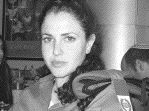Optimism collides with reality in Mideast
TEL AVIV_ In Ottawa, she captivated Canadians with her optimistic outlook and her pursuit of peace. Upon returning home to Israel, though, Michelle Divon was slapped in the face with some harsh Middle East reality.
“I could change more overseas than I can here,” she said recently at a Tel Aviv cafe.
“I was able to do something for my country overseas because I was overseas.”
A year ago, she was a Grade 12 student at Ashbury College: the dynamic daughter of the Israeli ambassador, the Canadian representative at the Global Young Leaders Conference in the U.S., the founder and co-director of Peace Camp Canada. Haim Divon, the former ambassador, said that by the time his family left Ottawa in September, “I was known as her father.”
Michal, as she is known at home, is now merely one of many: a private in the Israeli Defence Forces, personal number 7697255.
From the main gate of the Tel Hashomer military induction base, just outside Tel Aviv, a conflicting image emerges. The long curly hair and pursed-lipped smile are familiar. But the olive green uniform and beret on her shoulder seem foreign.
“My life has changed totally,” said Ms. Divon, 18. “It’s a shock. I can’t believe a year has passed.”
It’s been a whirlwind of a year.
In June, she graduated after four years at Ashbury College. In July, she attended the youth conference in Washington, D.C. In August, she launched the Peace Camp, for which she raised $100,000. It was a success: 10 young Israelis and 10 young Palestinians spent 10 days together in Ottawa, singing and sightseeing, dining and debating.
In September, she returned home to find a country weary after four years of an armed Palestinian intifada.
“I came back with a lot of optimism,” she said. “For the first month, every person I met I was talking their head off about politics and opinions. I wanted to hear everyone and try to send a certain message. I understood that it’s not that people here don’t want peace, it’s just that they’re sick of talking about it.”
She said that in Israel “talk is cheap. People want actions.”
Her political revelations were accompanied by some personal ones.
On Feb. 20, she joined the Israeli army for her two-year mandatory service.
Three weeks of basic training were a drastic change from her privileged Ottawa existence. Gone were the days of diplomatic cocktail parties and public addresses. Instead, she slept in a tent, fired rifles and scrubbed toilets.
Appearing exhausted, having endured a stressful day of grilling by army officials — a necessary stage in attaining her military security clearance — she reflected on the military’s impact on her life, casually shifting between English and Hebrew, her native tongue.
“Externally, a lot has changed,” she said, before adding, “but inside, nothing has changed.”
Her limited daily contact with Palestinians is one of those external changes. She finds it frustrating that Israelis and Palestinians could meet and talk a continent away, in Ottawa, but can’t do it at home, despite living next to one another.
Still, she has remained in touch with her Palestinian friends from the Peace Camp via phone and e-mail and remains committed to Israeli-Palestinian dialogue. Many of the Palestinians she knows, though, were surprised when she joined the army.
Ms. Divon said she explained to them her obligation as an Israeli, how being a soldier was part of being a member of society, how it had nothing to do with politics.
Forsan Hussein, her co-director at the peace camp, said he understood it was her duty and even saw a silver lining in her military service.
“I prefer not to see an army, period,” he said. “But overall it would probably be better to have someone like Michal Divon in the army, who relates to Palestinians as human beings and not as enemies, than seeing someone who is ignorant, fearful and is filled with hatred and violence.”
Nevertheless, he said, he knew why it could be difficult for many of the Palestinians. “When they see the green uniform, all they see is hostility, is hatred, is occupation,” he said.
That is something Ms. Divon hopes to change.
Aside from her own better understanding of Israeli society, her main goal in donning the uniform is to make a difference to the Palestinians who know her well.
“It is important for me that they know I haven’t changed and I won’t change,” she said. “Maybe through me, they’ll be able to see Israeli soldiers differently.”
She said she wished she could bring everyone she had met in the army to Peace Camp Canada. But making peace will have to wait until the end of her stint in the army.
“I still have the same mindset, but right now there is not much I can do,” she said. “I serve the country. In this framework, what I can do as far as changing things is very limited.”
In the meantime, she serves her role in the IDF foreign-relations unit and copes with Israeli reality, one day at a time.
“Here I’m just living the moment,” she said. “In Canada, I was always thinking about the future.”
While her post-army future now seems light years away, she said she hopes the Canadian chapter of her life is not yet over. After her discharge, she is planning to return and enrol at a Canadian university, most likely McGill.
She says she misses the freedom and the opportunities Canada provided, especially compared to the daily pressure of life in the army. Whether she eventually returns or not, she says her Ottawa years will remain a major part of the person she has become.
“I was lucky that I was exposed to a different way,” she said. “My experiences in Canada changed the way I view the world and that is something that will always be with me.”

 Contact aron
Contact aron RSS SUBSCRIBE
RSS SUBSCRIBE ALERT
ALERT